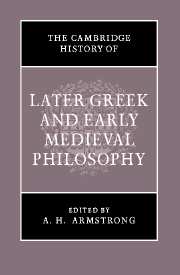Book contents
- Frontmatter
- Chapter 1 Introductory
- Part 1 GREEK PHILOSOPHY FROM PLATO TO PLOTINUS
- Part II PHILO AND THE BEGINNINGS OF CHRISTIAN THOUGHT
- Part III PLOTINUS
- Part IV THE LATER NEOPLATONISTS
- Part V MARIUS VICTORINUS AND AUGUSTINE
- Chapter 20 Marius Victorinus
- Chapter 21 Augustine. Biographical introduction: Christianity and philosophy
- Chapter 22 Augustine. Man: body and soul
- Chapter 23 Augustine. Reason and illumination
- Chapter 24 Augustine. Sense and imagination
- Chapter 25 Augustine. Human action: will and virtue
- Chapter 26 Augustine. God and nature
- Chapter 27 Augustine. Man in history and society
- Part VI THE GREEK CHRISTIAN PLATONIST TRADITION FROM THE CAPPADOCIANS TO MAXIMUS AND ERIUGENA
- Part VII WESTERN CHRISTIAN THOUGHT FROM BOETHIUS TO ANSELM
- Part VIII EARLY ISLAMIC PHILOSOPHY
- Select Bibliography
- Additional Notes and Bibliography
- Index of ancient and medieval works referred to in the text
- General Index
- Index of Greek terms
- References
Chapter 26 - Augustine. God and nature
from Part V - MARIUS VICTORINUS AND AUGUSTINE
Published online by Cambridge University Press: 28 March 2008
- Frontmatter
- Chapter 1 Introductory
- Part 1 GREEK PHILOSOPHY FROM PLATO TO PLOTINUS
- Part II PHILO AND THE BEGINNINGS OF CHRISTIAN THOUGHT
- Part III PLOTINUS
- Part IV THE LATER NEOPLATONISTS
- Part V MARIUS VICTORINUS AND AUGUSTINE
- Chapter 20 Marius Victorinus
- Chapter 21 Augustine. Biographical introduction: Christianity and philosophy
- Chapter 22 Augustine. Man: body and soul
- Chapter 23 Augustine. Reason and illumination
- Chapter 24 Augustine. Sense and imagination
- Chapter 25 Augustine. Human action: will and virtue
- Chapter 26 Augustine. God and nature
- Chapter 27 Augustine. Man in history and society
- Part VI THE GREEK CHRISTIAN PLATONIST TRADITION FROM THE CAPPADOCIANS TO MAXIMUS AND ERIUGENA
- Part VII WESTERN CHRISTIAN THOUGHT FROM BOETHIUS TO ANSELM
- Part VIII EARLY ISLAMIC PHILOSOPHY
- Select Bibliography
- Additional Notes and Bibliography
- Index of ancient and medieval works referred to in the text
- General Index
- Index of Greek terms
- References
Summary
The two chief—or even the sole—objects of interest to philosophy are God and the human soul. This was Augustine's view in his earliest works; and, ironically, the furthest departure from this view, that which owes most to philosophical inspiration, occurs in his long commentary on the book of Genesis, written some fifteen or twenty years later. It is here that he gives freest rein to the discussion of questions concerning nature other than human or divine. Nevertheless, physical nature never assumed the central place in Augustine's interests which the world of man and God held in them. The problems which interested Augustine most in this field were those which were forced upon his attention by the scriptural teaching. We shall confine our attention to three of them : the order of nature as related to God, natural function and development in the physical world, and time, all arising for Augustine from the doctrine of creation.
Two related thoughts form the kernel of Augustine's reflection on the physical world. These are that God created the world of nature and has ordered it, in the words of the Book of Wisdom often quoted by Augustine, ‘by measure and number and weight’ (xi. 20); and that this order in the world allows man to see the world as God's handiwork. The orderliness in which God created the world was universal and all-pervasive, except for such disturbances as were set up in it by sin or its effects. But this universal order, Augustine thought, was only apparent to men partially.
- Type
- Chapter
- Information
- Publisher: Cambridge University PressPrint publication year: 1967



